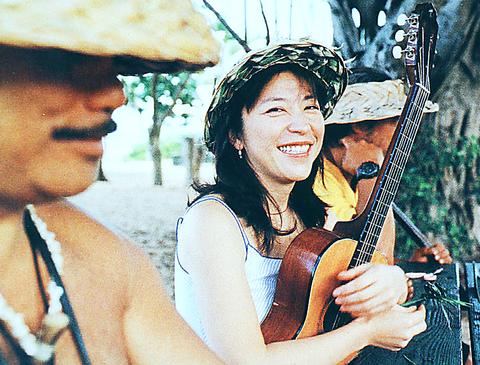When the late great Elvis Aaron Presley put the blue in Hawaii all those years ago he would have had no idea that one day a Brazilian-born Japanese woman would be bringing her own colorful brand of Blue Hawaii to Taiwan.
"Bossa Nova Hula: Lisa Ono's Blue Hawaii," the concert by singer/songwriter, violinist, acoustic guitar player, Lisa Ono, is set to have the auditorium of the Sun Yat Sen Memorial Hall swinging tonight, when the soulful-voiced jazz diva hits the stage as part of her summer tour. The concert is her only performance in Taiwan.
Born in Brazil to Japanese parents, Ono was introduced to the smoky jazz bar scene at a young age. While most of her peers were doing what normal 10 year-olds do, Ono was hanging out with her father at his popular Sao Paulo nightclub.

COURTESY OF EMI TAIWAN
After moving back to Japan, Ono's father opened the Saci Perer nightclub in Tokyo, where the teenage Ono began to perform a predominantly Brazilian repertoire of samba and bossa nova tunes. Now Ono performs many of her tunes in English and Japanese.
Dubbed the "Queen of Bossa Nova" in Japan, Ono has become one of the world's top practitioners of the mild and rhythmical form of Latin jazz.
Since debuting in 1989 with Catopili, an album on which the Sao Paulo native first began experimenting with her own style of samba and bossa nova, Ono has gone on to release 12 albums, the most successful of which being the 1999 jazz-influenced Dreams, a record which went on to sell over 200,000 copies worldwide.
Apart from selling over three million records since 1989, Ono has also been responsible for single-handedly shaping a bossa nova revival in Japan. Along the way she has collaborated with some of the biggest names in bossa nova and jazz, including "the pioneer of bossa nova" Antonio Carlos Jobim.
More recently, Ono teamed up with producer Eumir Deodato for her 2000 release, Pretty World. Deodato, who has worked with the likes of Roberta Flack, Aretha Franklin and Bjork, helped the performer add an original edge to the material on that album, which was a pot pourri of her own bossa nova interpretations of tunes by the likes of Stevie Wonder, Leon Russell and The Police. These fusions, while sounding at first rather odd have proven incredibly popular in her native Brazil, as well as in Japan.
For tonight's concert the queen of bossa nova will be performing a selection of tunes taken from her Pretty World album, which has only recently been released locally.
What: Lisa Ono Bossa Nova Hula: Lisa Ono's Blue Hawaii
When: Tonight
Where: Taipei's Dr Sun Yat Sen Memorial Hall (台北市國父紀念館), 505 Renai Rd., Sec. 4, Taipei (台北市仁愛路4段505號)
Tickets: Tickets cost between NT$900 and NT$2,500 and are available through ACER ticketing outlets or at the door.

The canonical shot of an East Asian city is a night skyline studded with towering apartment and office buildings, bright with neon and plastic signage, a landscape of energy and modernity. Another classic image is the same city seen from above, in which identical apartment towers march across the city, spilling out over nearby geography, like stylized soldiers colonizing new territory in a board game. Densely populated dynamic conurbations of money, technological innovation and convenience, it is hard to see the cities of East Asia as what they truly are: necropolises. Why is this? The East Asian development model, with

This is a deeply unsettling period in Taiwan. Uncertainties are everywhere while everyone waits for a small army of other shoes to drop on nearly every front. During challenging times, interesting political changes can happen, yet all three major political parties are beset with scandals, strife and self-inflicted wounds. As the ruling party, the Democratic Progressive Party (DPP) is held accountable for not only the challenges to the party, but also the nation. Taiwan is geopolitically and economically under threat. Domestically, the administration is under siege by the opposition-controlled legislature and growing discontent with what opponents characterize as arrogant, autocratic

June 16 to June 22 The following flyer appeared on the streets of Hsinchu on June 12, 1895: “Taipei has already fallen to the Japanese barbarians, who have brought great misery to our land and people. We heard that the Japanese occupiers will tax our gardens, our houses, our bodies, and even our chickens, dogs, cows and pigs. They wear their hair wild, carve their teeth, tattoo their foreheads, wear strange clothes and speak a strange language. How can we be ruled by such people?” Posted by civilian militia leader Wu Tang-hsing (吳湯興), it was a call to arms to retake

When Lisa, 20, laces into her ultra-high heels for her shift at a strip club in Ukraine’s Kharkiv, she knows that aside from dancing, she will have to comfort traumatized soldiers. Since Russia’s 2022 invasion, exhausted troops are the main clientele of the Flash Dancers club in the center of the northeastern city, just 20 kilometers from Russian forces. For some customers, it provides an “escape” from the war, said Valerya Zavatska — a 25-year-old law graduate who runs the club with her mother, an ex-dancer. But many are not there just for the show. They “want to talk about what hurts,” she